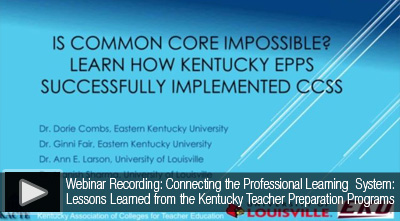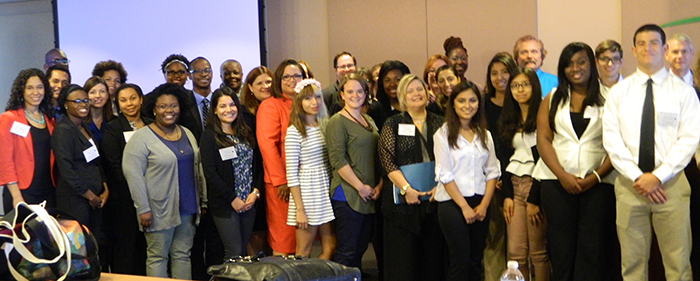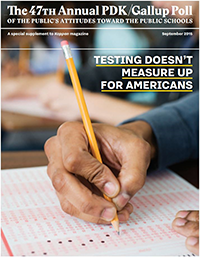05 Nov2015
By Sharon Robinson

As the Common Core State Standards (CCSS) and their kindred iterations continue to gain traction in schools around the country, staff development efforts have been bringing in-service educators up to speed, and colleges of education have been adjusting their curricula to ensure that the field’s newest professionals are also ready for the new standards. Nowhere has this shift seen greater success than in Kentucky, which was the first state to adopt and implement CCSS. A recent AACTE webinar sponsored by the Learning First Alliance’s “Get It Right” campaign highlighted the remarkable progress made by institutions in the state.
02 Nov2015
By Teri Langlie
Minnesota requires all teacher candidates to take edTPA as part of the state’s program review and approval process. At the state’s annual edTPA conference October 7, educators from across the state joined in invigorating conversations about the changes the assessment has spurred and the common language it has given educators to communicate about effective teaching.
During the session I helped moderate on how programs can use edTPA components and candidate performance data to “back map” their course work, the exchange was both lively and informative. Panelists shared stories about how they are getting edTPA performance data to more faculty, identifying needs, and developing instructional resources such as new observation rubrics that adjunct faculty can use to better understand teaching skills that edTPA asks candidates to demonstrate.
20 Oct2015
By Arlinda J. Eaton
Meaningful and purposeful collaboration among multiple agency heads is something that many states aspire to do. Georgia is among those that have been successful in forming such alliances, which provides a supportive environment for the work of the Georgia Association of Colleges for Teacher Education (GACTE).
The collaborative culture is well established in the Georgia Alliance of Education Agency Heads, which over the past decade has been successfully fulfilling its mission to collaborate, innovate, and achieve while addressing three strategic goals: (1) increase the percentage of students reading at grade level by completion of third grade; (2) increase the percentage of graduates from high school and postsecondary institutions prepared for the demands of college, workplace, a global economy, and responsible citizenship; and (3) increase the percentage of effective teachers and educational leaders. The alliance includes the state’s universities and technical colleges, the governor’s office, the Georgia Professional Standards Commission, and other education agencies.
13 Oct2015
By Jerrica Thurman
 Many educator preparation providers are highly engaged in the implementation of the Common Core State Standards (CCSS) and are actively working alongside PK-12 administrators, teachers, and parents to prepare students. Learn how AACTE member institutions in Kentucky are successfully implementing the standards in a free AACTE webinar, “Is Common Core Impossible?” Tuesday, October 20, at 2:00 p.m. EDT.
Many educator preparation providers are highly engaged in the implementation of the Common Core State Standards (CCSS) and are actively working alongside PK-12 administrators, teachers, and parents to prepare students. Learn how AACTE member institutions in Kentucky are successfully implementing the standards in a free AACTE webinar, “Is Common Core Impossible?” Tuesday, October 20, at 2:00 p.m. EDT.
Thanks to a grant from the Learning First Alliance’s Get It Right campaign, AACTE will host this webinar as the first in a two-part series on CCSS implementation in educator preparation programs. This webinar focuses on the successful work of the Kentucky Association of Colleges for Teacher Education in facilitating its members’ work to align their educator preparation programs with CCSS after Kentucky became the first state to adopt the standards. Presenters will discuss how a communication strategy, community involvement, policy advancement and alignment, and professional development and capacity building were used for successful implementation.
13 Oct2015
By Amanda Lester and Omar Davis

Participants in the inaugural Project LEAD Summit of the Associated Colleges of Illinois
On September 25, AACTE staff had the privilege of taking part in the inaugural Project LEAD (Leaders in Education Advocating for Diversity) Summit in Chicago, Illinois. The summit was a daylong conference conducted by the Associated Colleges of Illinois Center for Success in High-Need Schools to engage teacher candidates and faculty in interactive discussions focused on increasing diversity in the teacher workforce.
05 Oct2015
By Judy Boisen
Illinois has moved beyond the trial phase with edTPA, which became consequential here as of September 1, 2015. That’s why the recent state conference of the Illinois Teacher Performance Assessment Consortium (TPAC) was aptly named Moving Forward.
The event convened 131 educator preparation experts from 45 institutions and education organizations from across the state September 11-12 to discuss this next phase in our state’s edTPA journey.
25 Sep2015
By Amee Adkins, Tracy Spesia and John Snakenborg
Editor’s Note: This blog is based on a July 22 article in Teachers College Record (TCR). The full version is available here. The original article was written in response to a previously published TCR piece about edTPA.
We have been immersed in edTPA implementation for several years as the lead administrators for implementation support in Illinois and as scorers and scoring trainers. We have been committed to moving beyond compliance with state policy to using edTPA as a positive support for critical inquiry by faculty into teaching and learning.
08 Sep2015
By Aaron Goldstein
Fifteen high-level state policy makers recently completed the inaugural class of the Hunt-Kean Leadership Fellows program, a 9-month training for state policy makers on education policy issues. The Hunt Institute, a center based at the University of North Carolina at Chapel Hill, created the Hunt-Kean Leadership Fellows program in 2014 and named it in honor of former governors Jim Hunt (D-NC) and Tom Kean (R-NJ).
In their program, the fellows discuss and develop political and policy strategies around state education topics including teachers, school leaders, data systems, and higher education. The fellows are influential state leaders including governors, lieutenant governors, attorney generals, and state legislators considered to be some of the nation’s top “education catalysts of change.”
25 Aug2015
By Jerrica Thurman

AACTE’s more than 800 member institutions are dedicated to high-quality preparation that ensures the effectiveness, diversity, and readiness of professional educators, supporting the priorities of the American public surveyed in the 47th annual PDK/Gallup Poll of the Public’s Attitudes Toward the Public Schools. The recently released 2015 poll included questions on teacher quality and evaluation, standards, testing, and more, and a new online polling format captured selected demographic information, allowing for more disaggregated responses than past surveys.
The survey shows that 95% of Americans consider the quality of teachers to be very important and an integral factor for improving public schools. As in past years, an overwhelming majority of the U.S. public also is pleased with the performance of their local schools. Testing is viewed less favorably, though, including for teacher accountability purposes; 55% of Americans and 61% of public school parents oppose using student scores on standardized tests as part of teacher evaluations. Respondents also are skeptical of federal policy influences on public schools and of the Common Core State Standards.
17 Aug2015
By Ena Shelley
Early in my academic career as a faculty member, the Indiana Association of Colleges for Teacher Education (IACTE) was referred to as "the deans group." Its meetings were attended primarily by those holding administrative positions, which did not include me. Still, I got to work with IACTE during this time: I had been appointed by the governor to the Indiana Professional Standards Board (IPSB) for teacher education and licensure, which worked collaboratively with IACTE on developing new standards-based licensure and assessments. At a time when teacher education was truly valued in the state, our joint efforts placed Indiana as one of the front runners in best practices in teacher preparation and the use of performance-based assessments.
10 Aug2015
By Aaron Goldstein
Last week, I attended the National Conference of State Legislatures (NCSL) Legislative Summit along with over 5,000 state legislators and their staff. Teacher quality was a key theme of several sessions ranging from teacher career ladders to school leader preparation.
One of the significant points I took from the conference was that state legislators are eager to hear from teacher preparation programs on current practices and innovations. Please contact your state legislators prior to the upcoming 2016 legislative session to share what is happening at programs in your state!
04 Aug2015
By Sungti Hsu
A new report calls on states to ensure more intentional preparation of educators to work with struggling learners, including students with disabilities, English language learners, and students with unidentified learning and behavior needs, to address persistent achievement gaps. The report, issued by the Council of Chief State School Officers (CCSSO) and the University of Florida’s Collaboration for Effective Educator Development, Accountability, and Reform (CEEDAR) Center, builds on a 2012 paper from CCSSO about policies to transform educator preparation generally—whose recommendations were supported by AACTE—and echoes messages of a recent policy brief developed by AACTE and the National Center for Learning Disabilities.
27 Jul2015
By Robert C. Johnston
Starting this fall, the state of Georgia is strengthening its standards for licensing new teachers by requiring them to pass edTPA, a performance assessment indicating they really are effective and ready for the classroom.
The new requirement, part of a broad overhaul of the state’s structure for evaluating performance of both existing and brand new teachers, will take effect September 1. At that point, teacher candidates emerging from student teaching will receive their initial "induction" certification only after meeting a qualifying score on edTPA. In addition, teachers enrolled in Georgia’s GaTAPP nontraditional preparation program must pass edTPA prior to completing the program.
21 Jul2015
By Kayla Campbell

AACTE will host two webinars this fall on integrating the Common Core State Standards (CCSS) in educator preparation programs, thanks to a grant from the Learning First Alliance’s Get It Right campaign. These 60-minute webinars will highlight AACTE members’ successes and challenges in aligning their programs with CCSS.
Following the recommendations of the National Association of State Boards of Education report Common Themes, Individual Approaches: Six States’ Experiences With New Science Standards, these webinars will focus on four key areas of CCSS implementation: communication strategy, community involvement, policy advancement and alignment, and professional development and capacity building.
19 Jun2015
By Melissa M. Burnham
Last week, Nevada Governor Brian Sandoval signed into law Senate Bill 511, which establishes the Teach Nevada scholarship for students interested in completing PK-12 educator preparation programs throughout the state. Sponsored by Governor Sandoval and passed by the State Assembly on the last day of the 2015 session of the Nevada legislature, this bill devotes $2.5 million to student scholarships in each year of the coming biennium. An additional appropriation of $5 million per fiscal year provides funding for Nevada districts to provide financial incentives for new teacher hires.








 Many educator preparation providers are highly engaged in the implementation of the Common Core State Standards (CCSS) and are actively working alongside PK-12 administrators, teachers, and parents to prepare students. Learn how AACTE member institutions in Kentucky are successfully implementing the standards in a free AACTE webinar, “
Many educator preparation providers are highly engaged in the implementation of the Common Core State Standards (CCSS) and are actively working alongside PK-12 administrators, teachers, and parents to prepare students. Learn how AACTE member institutions in Kentucky are successfully implementing the standards in a free AACTE webinar, “
